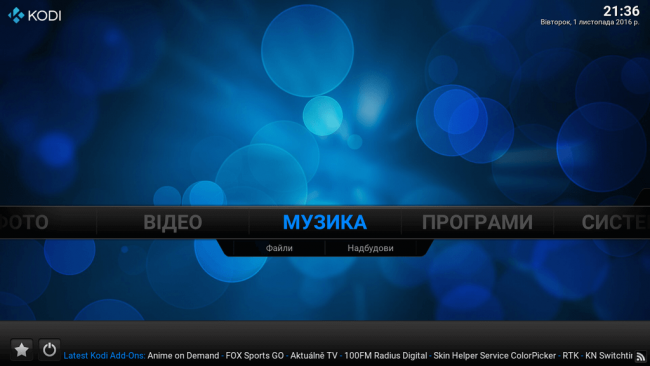
Then you need this guide.
Kodi is known for a lot of great stuff.
One of them is the fact that Kodi users are free to try out Kodi on a variety of different Linux machines.
That’s right.
Kodi makes it possible for all Linux users to try out the native version of its application.
The fact that you can install Kodi on different flavors of Linux means that users on the Linux platform no longer have to sit back and look at Windows and Mac users have all the fun.
They too can now count Kodi as an important tool in their entertainment arsenal.
Kodi on Linux not only plays different media files but also allows users to store content.
Now, the obvious question that we will try to answer in this guide is whether or not you can easily install Kodi on Linux.
In other words, in this guide, we will talk about how you can install Kodi on Linux.
Our guide contains the latest information coming out of the community and contains only those steps that actually work.
More specially, in this guide, we will restrict ourselves to the latest and perhaps the greatest version of Kodi that has ever come into existence.
That version is Kodi 18.
Or more commonly, Kodi Leia.
Our research shows that Kodi 18 Leia is the best version of Kodi till date for the simple reason that it has a ton of improvements which are aimed at Linux users.
These Linux-specific enhancements mean that the people working behind the scenes for Kodi care about those people who want to make use of the Kodi media player on their Linux machines.
Now, the other thing that readers should understand is that even though Kodi Leia is the latest edition of Kodi, it still works on the majority of machines that are running Linux operating systems even if they themselves are more than 10 years old.
Table of Contents
There are two methods of installing Kodi on Linux
In this section, we will take a look at how you can go about setting up Kodi, the most popular media player software and almost a digital home theater, on your machine.
Remember, in this guide, we will only deal with how users can install Kodi Leia 18 on Linux.
So the two methods are,
- Install Kodi on Linux which is Debian-based
- Install Kodi on Linux which is Ubuntu-based
Solution 1: How to easily install Kodi on Linux which is based on Ubuntu
Before talking about the more technical points, we will first deal with how to quickly install Kodi on the Linux platform that is based on the very popular Ubuntu flavor.
- So, perform a couple of clicks to open up the official Linux terminal Window.
You may already know where to click but our experience tells us that the following shortcut on your keyboard is the fastest and easiest way to do it: Ctrl + Alt + T.
There are other methods as well.
For example, what you can do is you can open up the Dash which also goes by the name of Super Key and then use your keyboard to type the word Terminal.
Once you do that you should see your Linux machine showing you the appropriate application in a new search results window. - Now, once you have activated the terminal, what we want you to do is to copy the text given below exactly as it appears:
sudo apt-get install software-properties-common
Then process enter.
After that provide your password.
Continue forward after inputting all the required information. - In this step we want you to copy paste the line:
sudo add-apt-repository ppa:team-xbmc/ppa
Now, press Enter. - You will have to wait for several seconds before the terminal does its thing and then copy-paste the command given below,
sudo apt-get update.
After that, press Enter. - When that is done you should copy the command,
sudo apt-get install Kodi
Then press the Enter button. - Your terminal may ask you whether or not you wish to proceed with the current installation process.
The terminal will show you a total of two potential answers.
There will be a Y for a simple Yes answer and an N for a No answer.
Needless to say, you need to type Y and then press the Enter key. - Now, your terminal should face no problems in downloading Kodi from the official website.
Your machine will also install Kodi locally.
Keep in mind that this process should not take more than a few minutes.
Our experience tells us that the actual time depends on nothing but the speed of your internet connection. - Once that is done, you really have nothing else left to do.
Now all you really need to do is to quit the terminal and then look at the place where you normally install your application.
You should see a Kodi icon there.
Again.
That is really it.
You will probably agree with us when we say that you do not have to work too hard in order to install Kodi on Linux.
With the help of nothing but a couple of lines of terminal commands, you can install Kodi on Linux.
Of course, you can make your life, even more, easier by simply copy-pasting the commands that we provided for you.
One other thing that you should remember is that you always have to press the Enter key after inputting the command in order to activate the command.
Let’s move on to method 2.
Method 2: How to quickly install Kodi on Linux based on Debian
We have already mentioned the fact that there are a multiple number of Linux flavors.
This section will deal with people who are making use of the Debian flavor.
- The first step is to generate a backup copy of the file named sources.list.
You actually need to open up your Terminal again with the help of Ctrl + Alt + T and then you need to copy-paste the command,
Sudo cp /etc/apt/sources.list/etc/apt/sources.list.bak.
Then you need to hit the enter button.
And then provide the terminal your password.
After that, click on Enter. - Now, we need you to copy-paste the code.
Gksudo gedit /etc/apt/sources.list.
Then press Enter.
Provide the terminal with your current credentials and press Enter. - Then copy paste the code,
deb http://ftp.debian.org/debian/ jessie-backsports main.
Then save the file and then close the same file.
The next step is to update the present local package index.
After that, you will install Kodi on Linux. - So open up the terminal window again and then type out the following code (you can copy-paste as usual as well),
sudo apt-get update.
Then you need to press the button that says enter.
And then you need to paste the command,
sudo apt-get install kodi.
After that, we need you to confirm your command. - The last step is for you to wait for the terminal to do its thing and download Kodi for you.
It will also install Kodi.
Once you see that the whole installation process has reached its completion stage, you will see the Kodi application where you normally see the installed applications.
Now, after you are done installing Kodi on Linux, there are a few commands that we want you to run just to be safe.
It doesn’t really matter if you already have all the video and audio codecs.
Our research shows that it never hurts to reinstall some of those codecs again and not run into problems with installing Kodi on Linux.
- Go to your terminal and type,
sudo apt-get install –install-suggests kodi - Then you need to update the PVR clients with the command,
sudo apt-get install kodi-pvr-mythtv - When that is done, we want you to add the IPTV Simple with the command,
sudo apt-get install kodi-pvr-iptvsimple. - When that is done you need to further add the new AirPlay component.
To do that type,
sudo apt-install shairplay
And that is it.
What are the official requirements of installing Kodi on Linux?
Now, before you actually install Kodi on Linux, you should know more about whether or not your machine is able to run the latest version of Kodi.
As mentioned before, Kodi and Linux both are very accommodating pieces of software.
In other words, they try to accommodate as many Kodi users as possible.
Our research shows that the percentage of Linux users who cannot use Kodi on their Linux machines is very small indeed.
Again, that is because of the fact that as a software Kodi is a pretty light one.
In other words, it does not require the user to have a massively expensive and powerful computer machine.
Nonetheless, it never hurts to go through the publicly-available official requirements that developers behind Kodi want Linux users to satisfy.
- CPU
If you have an x64 or x86 processor that is able to support SSE2 then you are ok.
To put it in simple terms, Kodi has full compatibility with any and all processors that came to the market in the past decade or so. - RAM
If you want to run Kodi without many problems on your computer machine running Linux, you must have at least 1GB RAM.
If you do not have that much RAM then you cannot run Kodi.
With that said, we recommend that you should at least have access to 2GB or RAm in order to make sure that Kodi runs smoothly on your machine. - Graphics
Now, if you are currently using a computer that has a graphics card or GPU which came to the market inside the last ten years then you can count on it running Kodi without many problems.
More specifically, graphics cards that are available in the market from companies such as Intel, Nvidia, and ATI/AMD are all good.
Kodi has this basic requirement where it wants the user’s graphics card to at least support OpenGL 2.0 or a newer version.
With that said, we recommend that users should have a slightly newer and hence more powerful GPU if they plan on streaming Full HD TV series or movies.
If you want to stream 4K movies, then there is no question about you having a powerful GPU.
You must. - Hard Disk space
Currently, the latest version of the official Kodi installation file eats up close to 150MB of empty space on your hard disk drive.
Now, the thing you need to keep in mind is that you should have a ton of space available for use if you have plans to import a huge number of movies or other kinds of files locally.
To put it in even simpler terms, what we want you to do is to store the whole of your content media library on the machine that you are using for Kodi.
Then you need to associate that library with your Kodi application.
On that note, please keep in mind that the official Kodi application will never try to make copies of your content.
However, it will make use of local directories.
Again, all depends on your streaming habits.
If you want to stream movies then you probably know it yourself that you will need more than 1GB of empty or free space.
If you do not have that then do not expect Kodi to provide you with a proper streaming experience. - Operating System
As far as the question of an operating system goes, our research shows that the latest Leia version of Kodi officially wants the user to at least have Ubuntu 16.10 Yakkety Yak.
The latest version of Kodi also works with Linux 17 and/or 19.
Apart from that, you can use it with 16.04 Xenial and of course, 14.04 Trusty.
Before everything else: Do not stream content on Kodi without first using a VPN
Why do we say that?
Here is a short list of reasons why no Kodi user should now even think about streaming content via Kodi without first making sure that there is a VPN service protecting him/her.
Again, do not skip this section if you want to make sure that you have a good time streaming content via Kodi.
If you do not use a VPN with Kodi then you run the risk of law enforcement authorities sneaking up on you for making use of illegal Kodi add-ons.
In short, illegal Kodi add-ons are not only illegal but they are also dangerous.
Knowingly or unknowingly a ton of Kodi users have made it a habit to download and install illegal Kodi add-ons.
And when they install these illegal Kodi Addons on their Kodi systems, they get full access to the latest and the greatest,
- Audio content
- Video content
- Movies
- Sports
- TV shows
And a lot more for the sweet sweet price of nothing.
Yes.
Illegal Kodi add-ons allow Kodi users to watch premium content for free.
Generally speaking, Kodi users do not like to make use of legal Kodi add-ons.
And we know that is because legal Kodi add-ons not only sometimes charge Kodi users money but have a limited supply of good content.
Or any content, as a matter of fact.
But here is the thing we want you to learn and then internalize:
Any type of premium video content that these illegal Kodi add-ons offer to Kodi users is, more often than not, illegal content.
These illegal Kodi add-ons usually show users content that is either scrapped or has copyrights on it.
Now, we do not know the moral repercussions of that but if a given Kodi user is making use of these illegal Kodi add-ons in order to access content on Kodi then the user’s internet service provider could start monitoring the activities of the said user.
How can an internet service provider do that?
Well, internet service providers have access to your IP addresses.
You probably do not need us to tell you that a given user’s IP address is pretty much everything that a given internet service provider needs in order to know everything about the user’s activities in the online world.
And once the given internet service provider gets a hold of all that user data, there is nothing stopping it providing all that user information to various government agencies or even third-party companies for the right price and legal cover.
Needless to say, this can mean some serious legal trouble for Kodi users.
If you want to make sure that you never find yourself in such a situation you need to sign up for a VPN service and connect to one of its servers BEFORE streaming content on Kodi.
A VPN service is probably the best tool that you can use to hide your online identity.
Good VPN service providers do that by rotating their customer’s IP address on a regular basis while the Kodi user is busy streaming content on Kodi.
This is just one way in which a VPN service is able to protect Kodi users from any and all kinds of prying eyes.
Easily bypass all geo-restrictions.
This is probably the most known advantage of making use of a VPN with Kodi.
You probably already know this that there are illegal Kodi add-ons and legal Kodi add-ons.
Contrary to what most Kodi users believe, not all legal Kodi add-ons are useless.
Some are pretty useful.
We’re talking about official Kodi add-ons such as,
- IceFilms
- NBC Sports
- BBC iPlayer
- Hulu
Now even though they have a good content of library and Kodi users want to make use of such official Kodi addons despite the fact that they charge a small amount of money for the privilege, these official Kodi addons have geo-restrictions placed on their content.
In fact, more and more official Kodi add-ons are taking the cue from these known official Kodi add-ons and they too are making use of geo-restrictions on their content.
A prime example, in this case, is AceStream that helps Kodi users to fetch high quality and in-demand data from various torrent sites.
If you want to make sure that you are able to unblock all such geo-restrictions then you have no other choice but to make use of a good VPN for Kodi.
The above reasons are just some of the reasons why all Kodi users should make use of a VPN service before streaming any content.
We have finally reached a point where legal trouble has started to become common and hence have no choice but to recommend all Kodi users to make use of a good VPN for Kodi if they want to stream content from Kodi in a safe way.
Now, you also probably do not need us to tell you that currently, the VPN market has a ton of options to offer to users.
And sometimes, Kodi users do not have enough time to go and give a try to each one of them to know which one is the best for their needs.
Sure, a lot of review sites and other Kodi guides sites would recommend a single VPN service provider like IPVanish, NordVPN or ExpressVPN as the best VPN for Kodi.
But at this point in time, because of the situation the VPN industry finds itself in (in other words, there are so many good VPN service providers that there is no single BEST VPN for anything anymore) we do not think that recommending all Kodi users a single VPN is in the best interest of Kodi users nor our reputation.
The best method of proceeding to know more about best VPN for Kodi is to read about the top VPNs that the industry has to offer for Kodi.
Then, the Kodi user should read briefly about those top VPN for Kodi options.
After that, the Kodi user is free to make his/her own decision.
Click here to read a guide just like that on best VPN for Kodi.
In that guide, we have some special offers for our readers as well.




